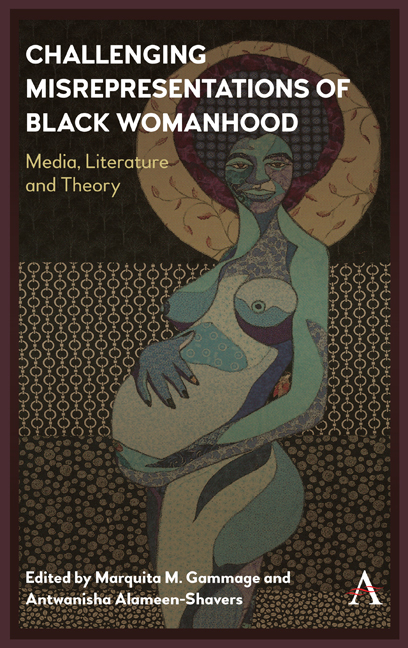Book contents
- Frontmatter
- Contents
- List of Figures
- Acknowledgments
- Introduction
- Chapter 1 Black Student Mothers: A Culturally Relevant Exploratory Study
- Chapter 2 Uninhabitable Moments: The Symbol of Serena Williams, Rage and Rackets in Claudia Rankine's Citizen: An American Lyric
- Chapter 3 “Black Women Are Genius!”: The Image of Celebrated Black Motherhood in Stand-Up Comedy?
- Chapter 4 The Virility of the Haitian Womb: The Biggest Threat to the Dominican Right
- Chapter 5 Ladyhood in Distress: Neoliberalism and Black Politics in Nicole Sconiers's Escape from Beckyville: Tales of Race, Hair, and Rage
- Chapter 6 Sapphires Gone Wild: The Politics of Black Women's Respectability in the Age of the Ratchet
- Chapter 7 Representing the Black Woman as Immoral and Abandoning the Black Family: A Cultural Analysis of Twenty-First-Century Television Dramas Starring Black Women
- Chapter 8 Historical Miseducation on Black Womanhood
- Chapter 9 Michelle Obama Laughs: Political Meme Warfare and the Regurgitation of the Mythological Black Woman
- Chapter 10 Kawaida Womanism as an Interpretative Framework for Understanding Africana Womanhood: Analyzing African American Women's Self-Perceptions
- List of Contributors
- Index
Chapter 5 - Ladyhood in Distress: Neoliberalism and Black Politics in Nicole Sconiers's Escape from Beckyville: Tales of Race, Hair, and Rage
Published online by Cambridge University Press: 29 May 2019
- Frontmatter
- Contents
- List of Figures
- Acknowledgments
- Introduction
- Chapter 1 Black Student Mothers: A Culturally Relevant Exploratory Study
- Chapter 2 Uninhabitable Moments: The Symbol of Serena Williams, Rage and Rackets in Claudia Rankine's Citizen: An American Lyric
- Chapter 3 “Black Women Are Genius!”: The Image of Celebrated Black Motherhood in Stand-Up Comedy?
- Chapter 4 The Virility of the Haitian Womb: The Biggest Threat to the Dominican Right
- Chapter 5 Ladyhood in Distress: Neoliberalism and Black Politics in Nicole Sconiers's Escape from Beckyville: Tales of Race, Hair, and Rage
- Chapter 6 Sapphires Gone Wild: The Politics of Black Women's Respectability in the Age of the Ratchet
- Chapter 7 Representing the Black Woman as Immoral and Abandoning the Black Family: A Cultural Analysis of Twenty-First-Century Television Dramas Starring Black Women
- Chapter 8 Historical Miseducation on Black Womanhood
- Chapter 9 Michelle Obama Laughs: Political Meme Warfare and the Regurgitation of the Mythological Black Woman
- Chapter 10 Kawaida Womanism as an Interpretative Framework for Understanding Africana Womanhood: Analyzing African American Women's Self-Perceptions
- List of Contributors
- Index
Summary
Nicole Sconiers's Escape from Beckyville: Tales of Race, Hair, and Rage (hereafter Beckyville) is a creative and chilling collection of dystopian stories of Black women's lives in a near-future West Los Angeles. For Sconiers (2012), Beckyville is not just a book— it and its accompanying nationwide tour and multimedia campaign constitute parts of her crusade to expand representations of Black women and to contest the assertion that Black people, particularly Black women, had no place in science fiction. Reflecting the experiences and anxieties of its origins in the experiences of relatively affluent Black women living and working in predominantly white environments, Beckyville adapts the tools and tropes of speculative genres to reflect a late-capitalist, neoliberal historical moment in which behavioral politics often appear to be the only acceptable means through which African Americans should seek change in their social conditions. Ladyhood— the performance of controlled, sexually constrained, aesthetically conservative Black femininity— is one form of African American behavioral politics that has damaging implications for both Black women's well-being and the larger project of social justice.
While Beckyville turns to the dystopian narrative largely to critique the constant microagressions and cultural narratives that Black women face in predominantly white, neoliberal society, it also intervenes in the intraracial strategies that are inseparable from this society. Sconiers uses the technological and fantastic to highlight the inadequacies of the project of Black ladyhood, as the futuristic West Los Angeles-dwelling protagonists of her stories find their attempts to perform respectable middle-class femininity attacked from both outside and within. I contend that these characters’ experiences elucidate the costs of ladyhood (and the limitations of the politics of liberal individualism) in an increasingly inequitable society.
I read literature through an expansive notion of politics that focuses not on voting behavior or formal institutions but on the diverse ways that our political beliefs and decisions are shaped and expressed through everyday spaces and cultural production. I am particularly interested in how Black thought and political practices— such as respectability and uplift— that are usually read as resistant, actually cooperate with broader ideologies— such as neoliberalism— that foster racial, class and gendered oppression.
- Type
- Chapter
- Information
- Challenging Misrepresentations of Black WomanhoodMedia, Literature and Theory, pp. 95 - 114Publisher: Anthem PressPrint publication year: 2019

